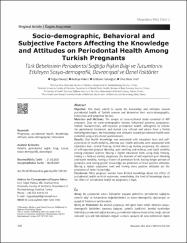Socio-demographic, Behavioral and Subjective Factors Affecting the Knowledge and Attitudes on Periodontal Health Among Turkish Pregnants
Citation
Peker, Kadriye & Ustaoğlu, Gülbahar & Ural, Ülkü. (2022). Socio-demographic, Behavioral and Subjective Factors Affecting the Knowledge and Attitudes on Periodontal Health Among Turkish Pregnants. Meandros Medical and Dental Journal. 23. 310-320. 10.4274/meandros.galenos.2021.98159.Abstract
Objective: This study aimed to assess the knowledge and attitudes toward periodontal health of Turkish women and determine their socio-demographic, behavioral, and subjective factors.Materials and Methods: The sample of cross-sectional study consisted of 407 pregnant. Data on socio-demographic factors, behavioral patterns, pregnancy -related characteristics, self-reported periodontal health, willingness to initiate the periodontal treatment, and dental care referral and advice from a family doctor/gynecologist, the knowledge and attitudes toward periodontal health were collected using a structured questionnaire.Results: Oral health knowledge was associated with education level and self -perception of tooth mobility, whereas oral health attitudes were associated with education level, dental flossing, dental check-up during pregnancy, the absence of self-reported gingival bleeding, gum swelling and redness, and tooth mobility among pregnant women. Having a higher education level, using daily flossing, having a check-up during pregnancy, the absence of self-reported gum bleeding and tooth mobility, having a history of premature birth, having longer periods of gestation, and having greater knowledge are predictors of more positive attitudes. Having a higher education level and having more positive attitudes are the predictors of better knowledge.Conclusion: Most pregnant women have limited knowledge about the effect of periodontal health on birth outcomes; nevertheless, the level of knowledge about the effect of periodontal health on pregnancy is high.

















